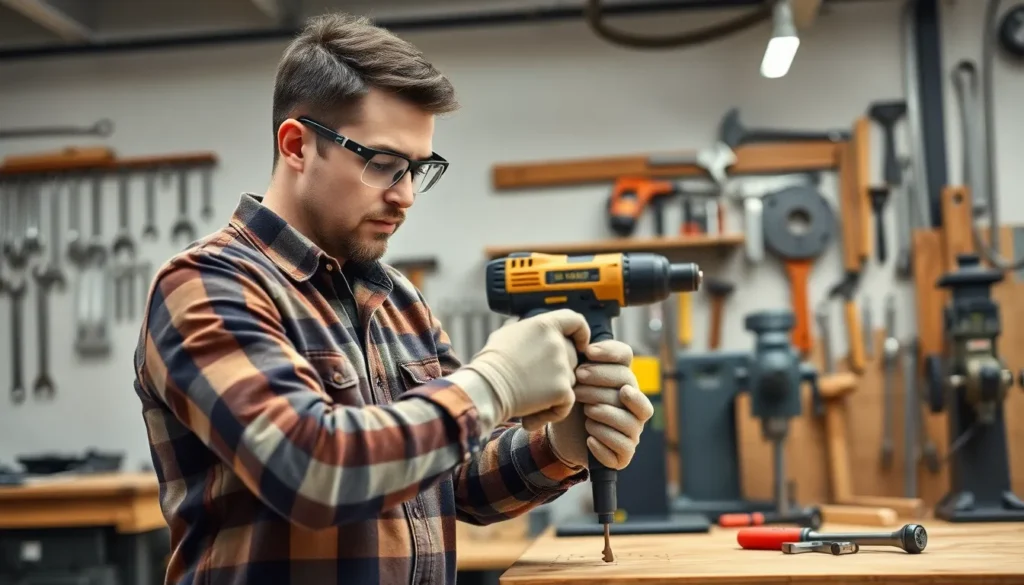Table of Contents
ToggleIn the world of mechanical workshops, tools are the unsung heroes, tirelessly working behind the scenes to bring projects to life. Picture a workshop without a trusty wrench or a reliable drill—it’s like a car without wheels, going nowhere fast. Whether it’s fixing a stubborn engine or crafting a custom piece, the right tools can make all the difference, turning a daunting task into an enjoyable challenge.
From the humble hammer to the sophisticated CNC machine, each tool has its own personality and purpose. They’re not just metal and plastic; they’re the magic wands of the mechanical realm. So, if you’re ready to dive into the fascinating world of mechanical workshop tools, buckle up! It’s time to explore how these essential gadgets can transform any DIY enthusiast into a master craftsman—minus the wizard hat, of course.
Overview Of Mechanical Workshop Tools
Mechanical workshop tools serve as the backbone of any effective workshop. Essential for both simple tasks and intricate projects, they enable craftsmen to execute their visions. Hand tools like hammers, pliers, and wrenches are foundational, allowing for precise manual adjustments and repairs.
Power tools bring efficiencies into the mix, with drills, saws, and grinders accelerating the process of material manipulation. When it comes to fabrication, machines like CNC mills and lathes transform raw materials into finished products, providing consistency and precision.
Safety equipment cannot be overlooked in mechanical workshops. Items such as safety goggles and gloves protect against potential hazards while working with tools and machinery. Proper organization also matters, making tool chests and racks integral components for maintaining a tidy workspace.
Storage solutions play a significant role in protecting tools and maximizing efficiency. Shelving units and pegboards help keep tools accessible and in designated places, facilitating a seamless workflow.
Choosing the right tools impacts project outcomes directly. Selecting high-quality tools ensures durability and enhances performance, leading to successful results. Investing in essential workshop tools creates a strong foundation for any mechanical endeavor.
Understanding the versatility of tools fosters creativity, allowing users to tackle a variety of projects. With the right combination of tools, individuals can develop their skills and push their creative boundaries in mechanical work.
Essential Hand Tools

Hand tools form the foundation of any mechanical workshop, enabling precision and control in a variety of tasks.
Wrenches
Wrenches serve a critical role in loosening or tightening nuts and bolts. Various types, including adjustable, socket, and torque wrenches, cater to specific needs. Adjustable wrenches offer versatility for different sizes of fasteners, while socket wrenches provide ease of use when accessing tight spaces. Torque wrenches ensure the correct tension is applied, crucial for safety in mechanical assemblies. Selecting high-quality wrenches contributes to project success and improves efficiency.
Screwdrivers
Screwdrivers come in various styles and sizes, essential for securing and removing screws. Their most common types include flathead and Phillips, tailored for different screw designs. Flathead screwdrivers excel in straightforward applications, whereas Phillips screwdrivers provide better grip and torque. Precision screwdrivers cater to smaller, intricate projects, ensuring accuracy in assembly tasks. A well-organized set of screwdrivers enhances workflow and reduces time spent searching for the right tool.
Pliers
Pliers are indispensable tools, utilized for gripping, twisting, and cutting. Types like needle-nose, slip-joint, and locking pliers, provide options for varied tasks. Needle-nose pliers excel in tight spaces where precision is needed, slip-joint pliers adjust to different sizes and shapes, and locking pliers securely hold materials in place. Quality pliers increase efficiency and provide durability during heavy-use situations. Each type of plier enhances capability and contributes to effective mechanical work.
Power Tools In The Workshop
Power tools play a vital role in mechanical workshops, significantly enhancing efficiency and precision. They enable craftsmen to tackle a diverse range of tasks with ease.
Drills
Drills are essential for creating holes in various materials like wood and metal. Their versatility allows users to switch between bits for different applications, such as drilling, screw driving, or even mixing. Cordless models offer portability, making it easy to work in tight spaces. Electric drills typically feature adjustable speed settings, granting better control depending on the project. Choosing a high-quality drill ensures durability and effective performance over time.
Saws
Saws are key power tools for cutting a range of materials, from wood to metal. Different types cater to specific needs; circular saws excel at making straight cuts, while jigsaws navigate curves effortlessly. Miter saws provide precise angled cuts, ideal for framing projects. Safety features, such as blade guards and electric brakes, enhance user protection. Selecting the appropriate saw improves accuracy and reduces the likelihood of material wastage.
Grinders
Grinders serve multiple purposes in a workshop, from sharpening tools to smoothing surfaces. Angle grinders are particularly versatile, capable of cutting, grinding, and polishing with the right attachments. Bench grinders provide stability for detailed work, making them suitable for sharpening and shaping. Using grinders with appropriate safety gear, such as goggles and gloves, minimizes the risk of injury. Investing in reliable grinders leads to improved finishes and more efficient workflows.
Specialized Equipment
Specialized equipment enhances precision and efficiency in mechanical workshops. Each tool serves a unique purpose, empowering craftsmen to take on complex tasks with ease.
Lathes
Lathes play a crucial role in shaping materials like metal and wood. By rotating workpieces against cutting tools, they create cylindrical designs. Different types of lathes, such as engine and turret lathes, cater to specific applications. Precision remains key, making it essential to choose high-quality models for optimal outcomes. Many craftsmen rely on lathes for producing components like axles or custom parts, showcasing their versatility in various projects.
Milling Machines
Milling machines provide versatility in cutting and shaping materials. They use rotating cutters to remove material from stationary workpieces, allowing for detailed designs not achievable with hand tools. Numerous mills exist, including vertical and horizontal variants, each suited for different tasks. Accuracy matters, so selecting a machine with the right specifications is vital. Many workshops utilize milling machines to create intricate designs or uniform parts, proving indispensable in modern mechanical craftsmanship.
Bench Tools
Bench tools streamline processes within mechanical workshops. These tools, designed for stability and precision, include vises, grinders, and belt sanders. Each bench tool offers unique advantages, enhancing efficiency and promoting safety. Workers often use vises to secure materials while cutting or drilling, ensuring precision. Grinders contribute to sharpening edges and finishing surfaces, while belt sanders provide smoothness and uniformity. Proper usage of bench tools cultivates a productive workshop environment, enhancing both skill and craftsmanship.
Safety Practices In The Workshop
Safety practices in a mechanical workshop are critical for preventing accidents. Protective gear such as safety glasses, gloves, and ear protection must always be worn to shield against injury. Using well-maintained tools enhances safety and minimizes risks associated with malfunctioning equipment.
Proper workspace organization promotes efficiency and reduces hazards. Tools should be stored in designated areas to prevent tripping or reaching accidents. Keeping floors clean and clutter-free allows for unhindered movement. Additionally, adequate ventilation is necessary when working with chemicals or power tools to avoid inhalation of harmful fumes.
Training sessions highlight safe operating procedures for using each tool. Every team member should understand emergency protocols and first aid responses. Regular safety audits ensure compliance with established safety standards. Fire extinguishers and first aid kits must be readily accessible to manage emergencies effectively.
Creating a culture of safety encourages communication about risks and safe practices. Remembering to inspect tools before use can prevent unexpected failures and ensure optimal performance. Always turn off tools and unplug them when not in use to eliminate potential hazards.
Implementing safety signs in critical areas serves as reminders of best practices. Adhering to safety standards fosters a secure workshop environment, allowing for increased productivity and creativity. Avoiding distractions during work promotes focus and prevents mistakes.
Regular safety meetings keep safety a priority, encouraging all members to participate in discussions about risks. Establishing a reporting system for unsafe conditions ensures prompt resolutions and continuous improvement in safety practices.
Mechanical workshop tools are more than just instruments; they’re the foundation of creativity and craftsmanship. By investing in high-quality tools and prioritizing safety, individuals can transform their workshop into a hub of innovation and efficiency.
Understanding the diverse range of tools available empowers users to tackle projects of all sizes with confidence. As they hone their skills and embrace safety practices, they not only enhance their productivity but also cultivate a culture of excellence in their craft. Ultimately, the right tools and a commitment to safety can unlock endless possibilities in the mechanical workshop.




